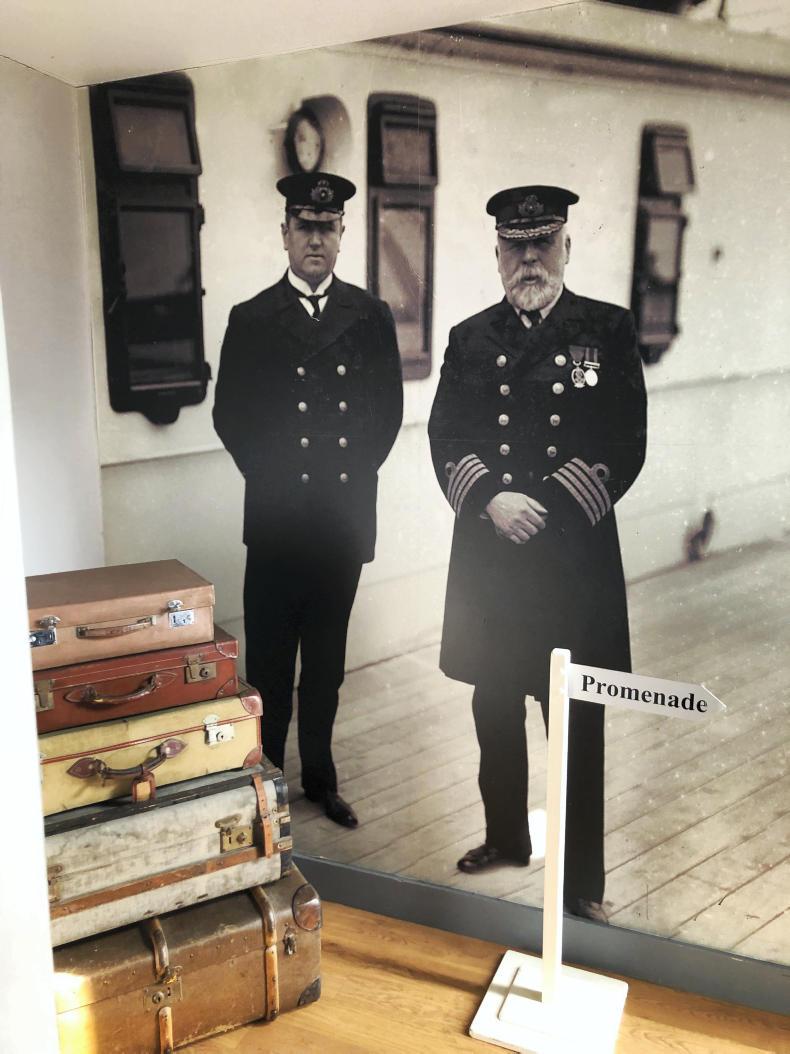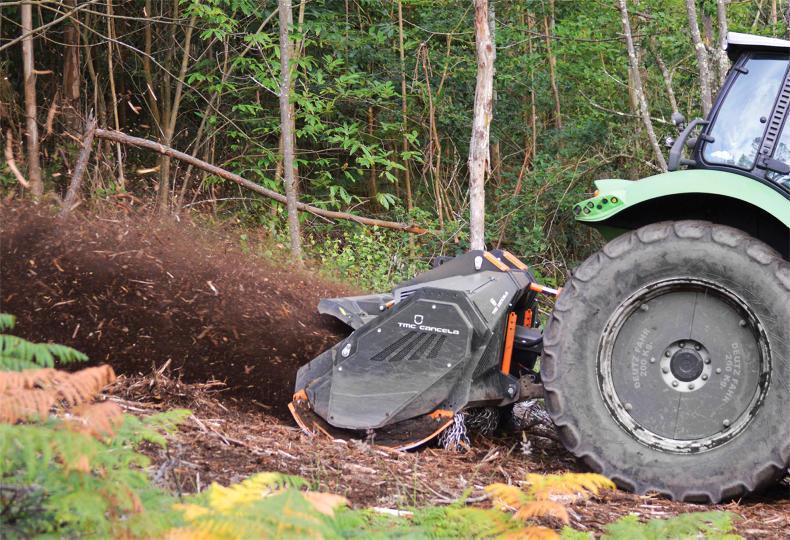I hire a mulcher, get a personal insight into why the Titanic sank. I learn a new word.
It started in the year 2000. In that year, I saw the film Titanic and with the help of a meitheal of three hard-working friends, we planted 500 oak trees on an acre at the back of my house in rural Co Kilkenny. They grew, every one of them. Oak trees have been around a long time and know how to suck nutrition out of damp, compacted soil.
Seventeen years later and thinnings, broken branches, old stumps – they had accumulated; gathered around my house like an invading force waiting for the signal to go in. I had created a wonderful oak wood but the byproducts were a problem. How about a big bonfire? Dangerous, and not very green. Neighbours dislike bonfires. How about meticulously cutting, storing and drying for firewood? Great idea, but time consuming and hard work. In the end the simplest and quickest solution: hire an industrial mulcher.
I named it The Beast. I towed it on site and it went to work. Savagely, frightening in its appetite to devour, chew and then eject as mulch all that was fed into its grinding, hungry, cavernous jaws. It did a superb job and reduced piles of branches and old trees to a hill of mulch. Wonderful, awe inspiring. I was proud of my heap. I had created something new, there it was, mine, something to show here, my very own mulch heap, grown by, cut by, and finally mulched by me.
Days had passed when I read an intriguing article giving a new angle on the cause of the sinking of the Titanic.
Apparently, it has always been known that there was a smoldering fire in those coal bunkers even before the great liner left Belfast
Never-seen-before photos, taken in Belfast before its maiden voyage, show dark patches on the hull of the great ship. These patches are at the place where its enormous bunkers stored thousands of tons of coal, for the hungry furnaces which powered its steam turbines.
Apparently, it has always been known that there was a smoldering fire in those coal bunkers even before the great liner left Belfast. With a coal strike in England at the time, in their desperation to get enough coal for its maiden journey, wet and dry coal had been stored together.
This combination, if packed densely enough, causes spontaneous ignition of the coal. The intensity of the heat of this smoldering coal, the theory has it, had weakened the steel bulkhead which had been designed to keep the ship afloat, even if punctured in four of its self-contained, self-sealing chambers.
It is known that when the great ship first hit the iceberg, it shuddered, but stayed afloat and level for the first hour, then it began to list badly and went down in twenty minutes. This other theory suggests that the steel bulkhead was weakened by the burning coal and suddenly gave way to the weight and cold of the mighty Atlantic, thus causing the great ship to tilt and quickly sink forever.

Titanic Experience Cork.
But was it possible that coal would self-ignite like this. I had never heard of, or experienced such a phenomenon, off to Google and yes, apparently the phenomenon is well-known and documented and understood. Coal can self-ignite, in an exothermic chemical reaction, especially if packed in great heaps, wet and dry coal together.
It was a well-known and frequent phenomenon on steam ships, “just don’t tell the passengers”. The stokers on the Titanic were instructed to be tight lipped regarding their volatile and burning coal bunkers.
But what has all this got to do with my mulcher? I hear you ask. As I was saying, I hired my mulcher, The Beast, and it devoured all it was given, resulting in a tidy wood and garden giving me my beautifully rounded hill of bark mulch.
I put my hand into it and felt heat, yes, a strong heat, it was heating, just like the coal on the Titanic
Two days later, I decided I would spread some of the mulch on a path I had dug into it, and to my amazement great belches of hot steam emitted from its core. I put my hand into it and felt heat, yes, a strong heat, it was heating, just like the coal on the Titanic, and if piled high enough might also self-ignite.
I had stumbled into a personal experiment in the wall of history. I had gained my personal understanding of Captain Edward John Smith’s dilemma. I spread my mulch to eliminate all fire risk. What a pity Captain Smith did not empty his bunkers and put out his fire before pointing his great ship to the open seas.
My new word “exothermic”, a chemical reaction which releases heat from within.
If you have a story to tell us, send your reader writes to amckeever@farmersjournal.ie
I hire a mulcher, get a personal insight into why the Titanic sank. I learn a new word.
It started in the year 2000. In that year, I saw the film Titanic and with the help of a meitheal of three hard-working friends, we planted 500 oak trees on an acre at the back of my house in rural Co Kilkenny. They grew, every one of them. Oak trees have been around a long time and know how to suck nutrition out of damp, compacted soil.
Seventeen years later and thinnings, broken branches, old stumps – they had accumulated; gathered around my house like an invading force waiting for the signal to go in. I had created a wonderful oak wood but the byproducts were a problem. How about a big bonfire? Dangerous, and not very green. Neighbours dislike bonfires. How about meticulously cutting, storing and drying for firewood? Great idea, but time consuming and hard work. In the end the simplest and quickest solution: hire an industrial mulcher.
I named it The Beast. I towed it on site and it went to work. Savagely, frightening in its appetite to devour, chew and then eject as mulch all that was fed into its grinding, hungry, cavernous jaws. It did a superb job and reduced piles of branches and old trees to a hill of mulch. Wonderful, awe inspiring. I was proud of my heap. I had created something new, there it was, mine, something to show here, my very own mulch heap, grown by, cut by, and finally mulched by me.
Days had passed when I read an intriguing article giving a new angle on the cause of the sinking of the Titanic.
Apparently, it has always been known that there was a smoldering fire in those coal bunkers even before the great liner left Belfast
Never-seen-before photos, taken in Belfast before its maiden voyage, show dark patches on the hull of the great ship. These patches are at the place where its enormous bunkers stored thousands of tons of coal, for the hungry furnaces which powered its steam turbines.
Apparently, it has always been known that there was a smoldering fire in those coal bunkers even before the great liner left Belfast. With a coal strike in England at the time, in their desperation to get enough coal for its maiden journey, wet and dry coal had been stored together.
This combination, if packed densely enough, causes spontaneous ignition of the coal. The intensity of the heat of this smoldering coal, the theory has it, had weakened the steel bulkhead which had been designed to keep the ship afloat, even if punctured in four of its self-contained, self-sealing chambers.
It is known that when the great ship first hit the iceberg, it shuddered, but stayed afloat and level for the first hour, then it began to list badly and went down in twenty minutes. This other theory suggests that the steel bulkhead was weakened by the burning coal and suddenly gave way to the weight and cold of the mighty Atlantic, thus causing the great ship to tilt and quickly sink forever.

Titanic Experience Cork.
But was it possible that coal would self-ignite like this. I had never heard of, or experienced such a phenomenon, off to Google and yes, apparently the phenomenon is well-known and documented and understood. Coal can self-ignite, in an exothermic chemical reaction, especially if packed in great heaps, wet and dry coal together.
It was a well-known and frequent phenomenon on steam ships, “just don’t tell the passengers”. The stokers on the Titanic were instructed to be tight lipped regarding their volatile and burning coal bunkers.
But what has all this got to do with my mulcher? I hear you ask. As I was saying, I hired my mulcher, The Beast, and it devoured all it was given, resulting in a tidy wood and garden giving me my beautifully rounded hill of bark mulch.
I put my hand into it and felt heat, yes, a strong heat, it was heating, just like the coal on the Titanic
Two days later, I decided I would spread some of the mulch on a path I had dug into it, and to my amazement great belches of hot steam emitted from its core. I put my hand into it and felt heat, yes, a strong heat, it was heating, just like the coal on the Titanic, and if piled high enough might also self-ignite.
I had stumbled into a personal experiment in the wall of history. I had gained my personal understanding of Captain Edward John Smith’s dilemma. I spread my mulch to eliminate all fire risk. What a pity Captain Smith did not empty his bunkers and put out his fire before pointing his great ship to the open seas.
My new word “exothermic”, a chemical reaction which releases heat from within.
If you have a story to tell us, send your reader writes to amckeever@farmersjournal.ie









SHARING OPTIONS